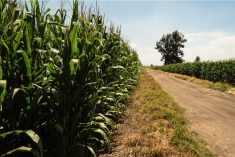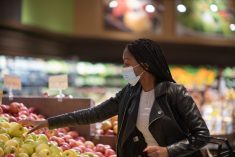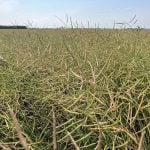Agriculture Minister Marie-Claude Bibeau is looking for ways to make Canada’s food supply more autonomous.
In an interview Thursday, Bibeau pointed to her minority Liberal government’s pledge in the throne speech to further support the food value chain.
That could mean a review of food infrastructure across the country, according to Bibeau.
Specifics aren’t yet available because the government is in “early steps” on such policy, she said, but added that the government has “realized even more” that the COVID-19 pandemic has made such discussion necessary.
Read Also

U.S. grains: Soy hits 17-month high, corn to four-month top as trade braces for U.S. data
Chicago Board of Trade soybean futures rose on Thursday to their highest in nearly 17 months as traders awaited a U.S. government crop report that was expected to lower yield estimates, while also bracing for the resumption of export data to give clues on Chinese buying.
“I want to have this discussion even more with the sector across the country to see what we can do to depend less, in some cases, on exports — but let’s be clear, Canada will remain a big producer and a big exporter of food,” she said.
“But I think there’s space for a bit more food autonomy and to be a bit more resilient, even if we are already in a good position, we can always do better,” she said. “We’ll see how it goes and what form of support it can take, but this is something that we do acknowledge and want to see how we can support it.”
The Canadian Agri-Food Policy Institute (CAPI) has previously shown the sector had turned a $1.1 billion trade deficit into a $2.7 billion trade surplus between 2015 and 2018, while highlighting how accelerating regulatory approval and simplifying and modernizing taxes while also addressing labour shortages could further unlock the potential of the industry.
Given the chaotic nature of global trade and several countries abandoning rules-based trade, at the same time as frustrations over the outcome of recent trade deals have resurfaced, it makes sense Bibeau’s government is exploring how to make Canadian food more self-reliant.
Bibeau also continues to focus on making the industry more inclusive for women.
While she regularly hosts roundtables of women when she travels, COVID-19 has prevented her from doing so. Her very first digital roundtable of women involved in agriculture was held Sept. 18.
“It was really interesting. We had women from across the country, representing different sectors and generations so it was interesting to see the different challenges that they raised,” she said. “Many of them mentioned the importance of mentorship and networking.”
Too often, she said, women stay at home looking after the kids while husbands or fathers attend networking opportunities.
“They miss opportunities to network and to meet with other people or other women, to find a mentor who will be able to support, to give advice. This is something they miss a lot, and it’s a reality not only in the ag sector,” she said. “That’s why I was so impressed with the success of our initiative with Farm Credit Canada.”
Launched in March 2019, the FCC Women Entrepreneur Program was designed to offer financing and resources to women in the sector.
Originally given $500 million over three years, the program has since approved loans for 1,391 women at a cost of $994.5 million. Additional loaning capacity given to FCC this spring will be used to keep the program open.
— D.C. Fraser reports for Glacier FarmMedia from Ottawa.















